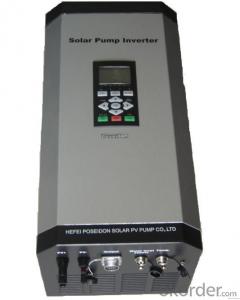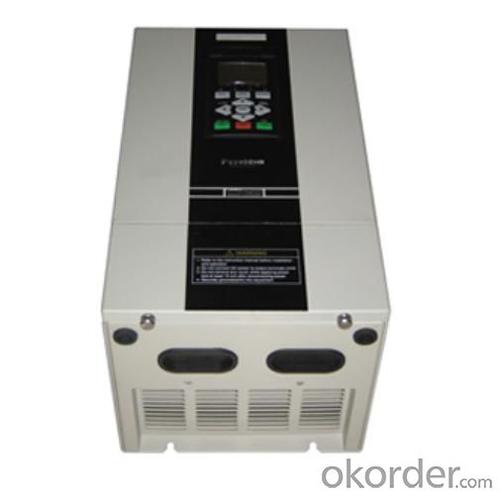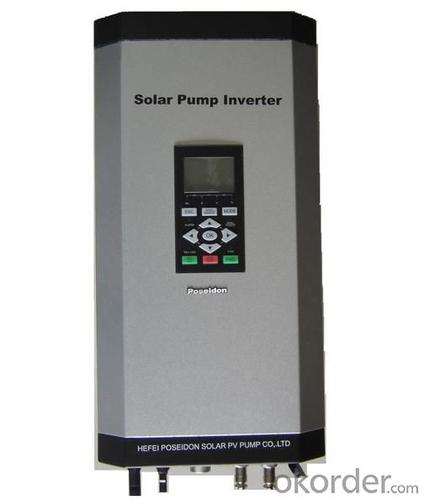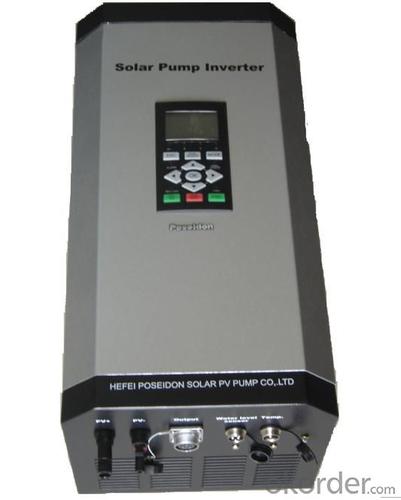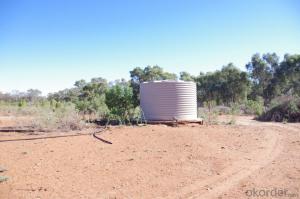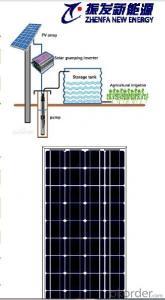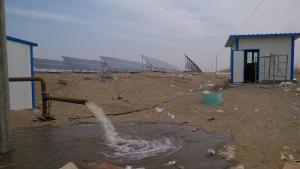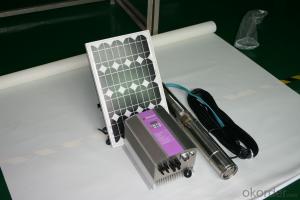Solar Pump for Rain Barrel FCPM30KH Inverter
- Loading Port:
- China Main Port
- Payment Terms:
- TT OR LC
- Min Order Qty:
- -
- Supply Capability:
- -
OKorder Service Pledge
Quality Product, Order Online Tracking, Timely Delivery
OKorder Financial Service
Credit Rating, Credit Services, Credit Purchasing
You Might Also Like
Solar pump inverter FCPM30KH Product Description:
Solar water pumping system is constructed with solar panel array,solar pump inverter and AC water pump, DC current produced from solar panel will be delivered to solar pump inverter,and it will convert it into AC current to drive water pump,and will automatically regulate output frequency according to sun radiance intensity,maximally realize MPPT tracking function.
Features
Adopting the proposed dynamic VI maximum power point tracking (MPPT) control method, with fast response, and reliable operation, achieves efficiency of 99%.
Designed with variable frequency driver, greatly improves efficiency
Extremely high efficiency
Digital mode control, with automatic operation and manual operation mode options
Complete protection functions
Adopts intelligent IPM module, with high reliability
LCD display and operation panel, in real time presents operating data
Optional for water level measurement and control circuit
Applicable for general ACC pumps, like centrifugal pump, piston pump etc.
Independent intellectual property; Highly effective, the redundant reliability, exempts the maintenance and the long life.
The pumps are soft started, fully protected.
No batteries are used. So better Sunlight, more water.
Datasheet.
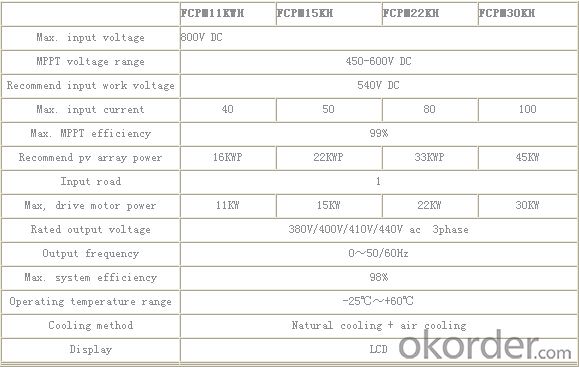
- Q: Can a solar pump be used for mine dewatering or industrial applications?
- Yes, a solar pump can be used for mine dewatering or industrial applications. Solar pumps are efficient and environmentally friendly alternatives to traditional pumps as they utilize solar energy to power the pumping system. They can effectively handle the dewatering needs of mines or other industrial sites, providing a reliable and cost-effective solution. Additionally, the use of solar pumps can help reduce dependency on fossil fuels and lower operational costs in the long run.
- Q: Can a solar pump be used in areas with high levels of pesticides in the water?
- Yes, a solar pump can be used in areas with high levels of pesticides in the water. Solar pumps are designed to draw water from various sources, including wells, rivers, and ponds. While it is important to consider the quality of water being pumped, solar pumps can effectively extract water from contaminated sources. However, it is recommended to use additional water treatment methods to ensure the safety and purity of the water for consumption or other uses.
- Q: Can a solar pump be used in areas with high levels of iron in the water?
- Yes, a solar pump can be used in areas with high levels of iron in the water. However, it is important to note that the iron content may pose certain challenges and require additional precautions. Iron in the water can cause clogging and damage to the pump system, affecting its efficiency and lifespan. Therefore, it is advisable to install proper pre-filtration systems or iron removal mechanisms to prevent any potential issues and ensure the longevity of the solar pump.
- Q: Can a solar pump be used for rainwater harvesting or collection?
- Yes, a solar pump can definitely be used for rainwater harvesting or collection. In fact, it is a highly efficient and environmentally friendly option for this purpose. A solar pump operates by converting sunlight into electricity, which powers the pump to extract water from a well, borehole, or other water source. This pumped water can then be stored in tanks or reservoirs for later use, such as irrigation, household chores, or even drinking water. Therefore, by utilizing a solar pump, rainwater can be efficiently collected and stored, reducing the reliance on traditional energy sources and minimizing the overall carbon footprint. Additionally, solar pumps are often more cost-effective in the long run as they eliminate the need for electricity or fuel, making them a sustainable solution for rainwater harvesting or collection.
- Q: What is the impact of a solar pump on poverty alleviation?
- A solar pump has a significant impact on poverty alleviation. By providing clean and reliable access to water for irrigation, it enables smallholder farmers to increase their agricultural productivity and income. This helps lift them out of poverty by reducing their dependency on rain-fed agriculture and increasing food security. Additionally, solar pumps eliminate the need for expensive diesel or electricity-powered pumps, reducing operational costs and making them more affordable for farmers in remote and off-grid areas. Overall, the use of solar pumps contributes to improved livelihoods, economic growth, and reduced poverty in rural communities.
- Q: How does a solar pump handle water source contamination from industrial waste?
- A solar pump does not directly handle water source contamination from industrial waste. However, it can be used in conjunction with other water treatment systems to mitigate the effects of contamination. The contaminated water can be pumped into a treatment system where it undergoes various processes like filtration, disinfection, and chemical treatment to remove or neutralize pollutants before being utilized or discharged safely.
- Q: Can solar pumps operate during cloudy days?
- Solar pumps can operate during cloudy days, but their efficiency may be reduced. The amount of power generated by the solar panels will be lower due to the reduced sunlight, resulting in a decrease in the pump's performance.
- Q: Can a solar pump be used for irrigation?
- Yes, a solar pump can be used for irrigation. Solar pumps utilize solar energy to power the pump, making them a sustainable and cost-effective solution for irrigation needs. They can be used for various applications such as watering crops, gardens, or even supplying water to livestock. Solar pumps offer an environmentally friendly alternative to traditional fuel-powered pumps, reducing carbon emissions and operating costs.
- Q: What is the maximum operating temperature of a solar pump?
- The maximum operating temperature of a solar pump can vary depending on the specific model and manufacturer. However, in general, most solar pumps can operate efficiently in temperatures ranging from -20°C to 50°C (-4°F to 122°F).
- Q: Can a solar pump be used in saltwater or corrosive environments?
- Indeed, the utilization of a solar pump is feasible even in saltwater or corrosive surroundings. Nevertheless, it is crucial to opt for a pump explicitly engineered for such circumstances. Conventional pumps might not endure the corrosive impact of saltwater. Seek out pumps constructed from materials such as stainless steel or other alloys that are resistant to corrosion. Furthermore, it is advisable to employ a pump equipped with a sealed motor to avert any harm arising from dampness or saltwater exposure. By meticulously selecting the appropriate pump for the task, solar pumps can be effectively employed in saltwater or corrosive environments, including coastal areas or industrial settings.
Send your message to us
Solar Pump for Rain Barrel FCPM30KH Inverter
- Loading Port:
- China Main Port
- Payment Terms:
- TT OR LC
- Min Order Qty:
- -
- Supply Capability:
- -
OKorder Service Pledge
Quality Product, Order Online Tracking, Timely Delivery
OKorder Financial Service
Credit Rating, Credit Services, Credit Purchasing
Similar products
Hot products
Hot Searches
Related keywords


